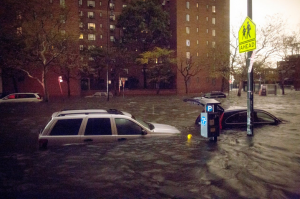It was not our imagination. It actually happened.
Yes, a year ago at this time Hurricane Sandy hit the NY/NJ region and left in its wake damaged homes and buildings, displaced families and businesses, and major disruption to business as usual.
This year children will go out trick or treating and (hopefully) stop thinking that this unofficial holiday of Halloween is routinely rescheduled, what with the storms of the last two years. Life has returned to normal for most of us. However, for some of us it has not, and there is now or will be a “new normal”.
And so what are the lessons learned, and are we better prepared than we were before? While we have made and still are making great efforts to better prepare our communities and the region as a whole, the simple answer is we don’t know conclusively until the next major disaster event whether we are adequately prepared. Emergency management and its major component, preparedness, are a process of continuous improvement, and so, with that understanding, we must always look to the lessons of the past, always look to step up our game, and always be prepared at the household level, community, and greater regional community as a whole.




